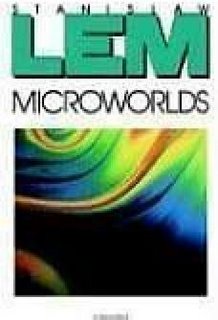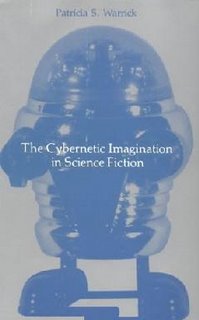Why Science-Fiction failed
As usual during my time in the US, I often browse through what I would call "vintage Sci-Fi", written at the height of the Cold War by various more or less scientifically inclined more or less talented writers. Why is Science-Fiction overall so disappointing? This question was considered and rather beautifully analyzed in Stanislaw Lem's book Microworlds.

Still, it is worth a further reflection, even if what I can offer falls short of the excellent treatment provided by Lem. The trouble, in my view, is that it invariably (at least in its American incarnation) fails to deliver what it promises. For one thing, a great deal of "Science" fiction has nothing at all to do with science, and, when it does, it is more often than not in the form an ill informed anti-scientific propaganda. This is the case for even the best (from the literary viewpoint) visions of utopian and dystopian worlds, starting with Huxley's Brave New World (but for something really pessimistic about the fate of human nature read "Ape and Essence" by the same author) to Orwell's 1984. These evolved into a whole series of portraits of machine run, de-humanized, oppressive technological societies. Even the "positive" utopian world that H.G.Wells describes in his Modern Utopia is hardly a step forward from the not so utopian state of 20th century human civilization.

As remarked in Patricia Warrick's excellent book "The cybernetic imagination in Science Fiction", the visions of computers and artificial intelligence promoted in science fiction novels, far from being futuristic, are in fact usually falling behind the actual scientific developments of the time and they invariably fail (with rare exceptions analyzed in the book) to give any original perspective on the topic, save for the well trodded path of the dystopian world dominated by the evil and fascistic machine. What a bore!
The main trouble with Science Fiction is the failure of the imagination. I looked briefly at a collection of stories by the supposed master of hard sci-fi Hal Clement (those collected under the 1965 title "Citizens of space"). Praised for the capacity to present truly alien perspectives, he in fact gives a description of alien life forms living an all too recognizable American suburban life of the late 1950s, all terribly alien and disquieting to my perspective, for sure, but hardly so to his intended readers. So, while Stanislaw Lem (the only true science fiction writer known in the west) was giving us sentient oceans and the inscrutable Quintants, a robotic arms race on the moon that evolves into inconceivable new forms of intelligence, and the mysterious message from the stars in "His master's voice", the American created aliens were endowed with suburban wives that fixed them meals. A total failure of the imagination! It is a pity that this genre so full of promise failed so miserably to deliver (exceptions made for Lem, Strugatsky, and the like). It could have been a truly new literary form of the 20th century, adapted to a scientific and technological society (and not trying to run away from it in a return to improbable mystical middle ages as happens in the so called fantasy genre, nor taking refuge in an irrational rage against the machine). It could have been literature in the first place, and that means experimenting with language and writing along with what was done in many other areas of 20th century literature. If Sci-Fi was to portray the future, then why present it in the obsolete form of bad action-adventure narrative?
Here's some (undoubtly very personal) idea of what Science Fiction should be.
- Real science is crucial to science fiction. A literary genre associated to hard science can create room for the type of informal and philosophical discussions about current results for which there is little room in the general accepted style of scientific papers and reports.
- Experimenting with language and narrative structures. This has been done widely in many aspects of 20th century literature and the literary enterprise of the 21st century, especially if it aims at being projected into the future, cannot ingnore the previous century's lesson. An important example is the use of mathematical structures in literary composition (including but not restricted to the use of statistical and aleatory methods in composition, which has been experimented by various 20th century authors).
- Truly original sociological perspectives: sci-fi has, like any other product of human culture, a political aspect. An important ingredient of the science fiction genre should be to portray truly original social and political perspectives, thus avoiding the more or less unconscious reproduction of the present reality with all its assumed stereotypes ridiculously projected onto distant worlds and alien life forms and into the distant future.

Still, it is worth a further reflection, even if what I can offer falls short of the excellent treatment provided by Lem. The trouble, in my view, is that it invariably (at least in its American incarnation) fails to deliver what it promises. For one thing, a great deal of "Science" fiction has nothing at all to do with science, and, when it does, it is more often than not in the form an ill informed anti-scientific propaganda. This is the case for even the best (from the literary viewpoint) visions of utopian and dystopian worlds, starting with Huxley's Brave New World (but for something really pessimistic about the fate of human nature read "Ape and Essence" by the same author) to Orwell's 1984. These evolved into a whole series of portraits of machine run, de-humanized, oppressive technological societies. Even the "positive" utopian world that H.G.Wells describes in his Modern Utopia is hardly a step forward from the not so utopian state of 20th century human civilization.

As remarked in Patricia Warrick's excellent book "The cybernetic imagination in Science Fiction", the visions of computers and artificial intelligence promoted in science fiction novels, far from being futuristic, are in fact usually falling behind the actual scientific developments of the time and they invariably fail (with rare exceptions analyzed in the book) to give any original perspective on the topic, save for the well trodded path of the dystopian world dominated by the evil and fascistic machine. What a bore!
The main trouble with Science Fiction is the failure of the imagination. I looked briefly at a collection of stories by the supposed master of hard sci-fi Hal Clement (those collected under the 1965 title "Citizens of space"). Praised for the capacity to present truly alien perspectives, he in fact gives a description of alien life forms living an all too recognizable American suburban life of the late 1950s, all terribly alien and disquieting to my perspective, for sure, but hardly so to his intended readers. So, while Stanislaw Lem (the only true science fiction writer known in the west) was giving us sentient oceans and the inscrutable Quintants, a robotic arms race on the moon that evolves into inconceivable new forms of intelligence, and the mysterious message from the stars in "His master's voice", the American created aliens were endowed with suburban wives that fixed them meals. A total failure of the imagination! It is a pity that this genre so full of promise failed so miserably to deliver (exceptions made for Lem, Strugatsky, and the like). It could have been a truly new literary form of the 20th century, adapted to a scientific and technological society (and not trying to run away from it in a return to improbable mystical middle ages as happens in the so called fantasy genre, nor taking refuge in an irrational rage against the machine). It could have been literature in the first place, and that means experimenting with language and writing along with what was done in many other areas of 20th century literature. If Sci-Fi was to portray the future, then why present it in the obsolete form of bad action-adventure narrative?
Here's some (undoubtly very personal) idea of what Science Fiction should be.
- Real science is crucial to science fiction. A literary genre associated to hard science can create room for the type of informal and philosophical discussions about current results for which there is little room in the general accepted style of scientific papers and reports.
- Experimenting with language and narrative structures. This has been done widely in many aspects of 20th century literature and the literary enterprise of the 21st century, especially if it aims at being projected into the future, cannot ingnore the previous century's lesson. An important example is the use of mathematical structures in literary composition (including but not restricted to the use of statistical and aleatory methods in composition, which has been experimented by various 20th century authors).
- Truly original sociological perspectives: sci-fi has, like any other product of human culture, a political aspect. An important ingredient of the science fiction genre should be to portray truly original social and political perspectives, thus avoiding the more or less unconscious reproduction of the present reality with all its assumed stereotypes ridiculously projected onto distant worlds and alien life forms and into the distant future.


<< Home